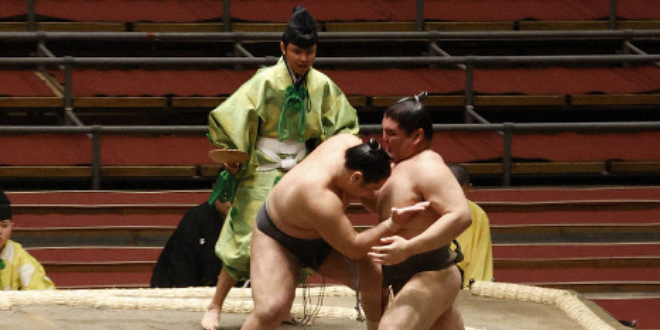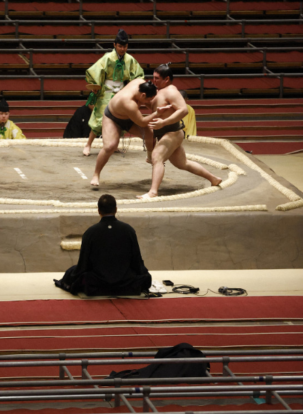



Hakuho
a bien débuté le tournoi ce dimanche en Endo à l’Edion Arena d’Osaka…vide.
Ce tournoi se déroule à huis clos après que l’Association japonaise de sumo, au début du mois, ait pris la décision sans précédent d’éloigner les spectateurs pour aider à lutter contre l’épidémie de coronavirus en cours.
Avant le coup d’envoi des combats de première division, le président de la JSA, Hakkaku, a prononcé une allocution dans laquelle il a remercié les fans de sumo pour leur soutien continu malgré le tournoi se déroulant dans des conditions aussi inhabituelles.
« Pour les lutteurs, cette rencontre sera très difficile, mais nous sommes reconnaissants aux fans qui les encouragent », a déclaré Hakkaku.
« Nous espérons répondre aux attentes de tous ceux qui regardent la télévision. »
L’ancien ozeki Kotoshogiku a comparé la compétition dans l’atmosphère tamisée à un rite religieux.
« C’est une atmosphère sanctifiée, comme aller dans un sanctuaire (shinto) », a déclaré le joueur de 36 ans, qui se bat maintenant au bas du classement de la division supérieure en tant que maegashira n ° 13. « Encore une fois, j’ai senti qu’il s’agissait bien d’un lieu sacré et je veux lui donner tout ce que j’ai. »
Le grand champion Hakuho, qui aura 35 ans mercredi, vise à porter son record de championnats de carrière à 44. Lui et son compatriote yokozuna Kakuryu, né en Mongolie, se sont retirés du précédent tournoi pour blessures.
Hakuho a ouvert le combat avec une gifle dure au visage du komusubi Endo.
La victoire résonne en réponse à la défaite d’Hakuho contre Endo également en janvier avant de se retirer avec une fièvre causée par une infection cutanée.
Kakuryu n’a eu aucun mal à envoyer le maegashira n°1 Daieisho, remportant une victoire rapide par poussée arrière. Malgré une belle charge initiale de Daieisho Kakuryu montra un jeu de jambes rapide pour se placer derrière l’ancien komusubi et l’envoyer par-dessus la limite des ballots de paille d’une poussée dans le dos.
Takakeisho, le seul ozeki après le départ à la retraite de Goeido, a facilement battu Takayasu, désormais maegashira 1.
Le sekiwake Asanoyama a ouvert sa candidature pour une deuxième coupe de l’empereur en expulsant le n ° 2 Okinoumi.
Asanoyama, 26 ans, vise une promotion au rang d’oseki après son score de 10-5 en janvier. S’il remporte 12 combats ici, il obtiendra 33 victoires au cours de trois compétitions, l’une des normes pour la promotion ozeki.
Le sekiwake Shodai – combattant dans l’un des trois rangs des « sanyaku » en dessous de yokozuna pour la première fois en trois ans – a remporté une victoire sans appel contre le n ° 2 Tokushoryu, vainqueur surprise du tournoi du Nouvel An.
Le komusubi Hokutofuji, effectuant également son retour à Sanyaku, a perdu contre le n ° 3 Yutakayama. Aucun des deux n’ayant pris le dessus à l’ouverture, Yutakayama a remporté une bataille de poussées pour remporter la victoire.
Le populaire n ° 4 Enho, le lutteur le plus petit et le plus divertissant de la division makuuchi, a déclaré que le manque de foule l’avait laissé sans son étincelle habituelle.
« Mon esprit de combat n’était pas là », a-t-il déclaré après sa défaite face au n ° 3 Mitakeumi.
OSAKA (Kyodo) — Hakuho made a winning start to the Spring Grand Sumo Tournament on Sunday, overpowering Endo at an empty Edion Arena Osaka.
The 15-day tournament is taking place behind closed doors after the Japan Sumo Association earlier this month made the unprecedented decision to keep out spectators to help combat the ongoing coronavirus outbreak.
Before the top-division bouts kicked off, JSA Chairman Hakkaku delivered an address in which he thanked sumo fans for their continued support despite the tournament being held under such unusual conditions.
« For the wrestlers, this meet will be very difficult, but we are grateful for fans voicing encouragement, » Hakkaku said.
« We hope to meet the expectations of everyone watching on television. »
Former ozeki Kotoshogiku likened competing in the subdued atmosphere to a religious rite.
« It has a sanctified feel to it, like going to a (Shinto) shrine, » said the 36-year-old, who is now fighting near the bottom of the upper-division rankings as a No. 13 maegashira. « Yet again I felt that this is indeed a sacred place, and I want to give it all I have. »
Grand champion Hakuho, who will turn 35 on Wednesday, is aiming to extend his record for career championships to 44. Both he and fellow Mongolian-born yokozuna Kakuryu pulled out of the previous New Year Grand Sumo Tournament in January due to injury.
Hakuho opened with a hard slap to the face of komusubi Endo, who appeared to lose his footing before getting yanked to the clay by the all-time great, who took Japanese citizenship last year.
The resounding win was payback for Hakuho, who lost to Endo in January before withdrawing with a fever caused by a skin infection.
Kakuryu had little trouble dispatching No. 1 maegashira Daieisho, claiming a quick victory by rear push out. Daieisho charged hard at the jump, but Kakuryu showed quick footwork to get behind the former komusubi and send him over the straw with a shove in the back.
Takakeisho, the sole ozeki following the retirement of Goeido, outmaneuvered No. 1 Takayasu to improve to 5-6 in their head-to-head meetings.
Takayasu opened with a hard hit but Takekeisho held firm against the former ozeki, stepping to the side to move him off balance before shoving him out.
Sekiwake Asanoyama opened his bid for a second Emperor’s Cup by forcing out No. 2 Okinoumi. The winner of last year’s summer tourney took a belt grip but was made to work by Okinoumi, who resisted two force out attempts before succumbing to a third.
The 26-year-old Asanoyama is aiming for promotion to sumo’s second-highest rank after going 10-5 in January. Should he win 12 bouts here, he will reach 33 wins over three meets, one of the standards for ozeki promotion.
Sekiwake Shodai — fighting in one of the three « sanyaku » ranks below yokozuna for the first time in three years — secured a straightforward win against No. 2 Tokushoryu, the surprise winner of the New Year tournament.
The Tokitsukaze stable grappler took a left underarm grip at the jump and quickly shoved his larger opponent over the straw.
Komusubi Hokutofuji, also making his sanyaku return, lost to No. 3 Yutakayama. With neither gaining the upper hand at the opening, Yutakayama won a pushing and thrusting battle to claim victory by frontal push out.
Popular No. 4 Enho, the smallest and most entertaining wrestler in the makuuchi division, said the lack of a crowd left him without his usual spark.
« My fighting spirit wasn’t there, » he said after his loss to No. 3 Mitakeumi. « Whatever it was I was fighting for today, I couldn’t find it. I need to find some inspiration. »
Written by Kyodo
| Rikishis | Score | Kimarites | Score | Rikishis |
| Kotonowaka 琴ノ若 (Maegashira 18) | | | | | Daiamami 大奄美 (Maegashira 17) | |
| Meisei 明生 (Maegashira 17) | | | | | Shimanoumi 志摩ノ海 (Maegashira 16) | |
| Azumaryu 東龍 (Maegashira 16) | | | | | Chiyomaru 千代丸 (Maegashira 15) | |
| Tsurugisho 剣翔 (Maegashira 15) | | | | | Nishikigi 錦木 (Maegashira 14) | |
| Kaisei 魁聖 (Maegashira 14) | | | | | Aoiyama 碧山 (Maegashira 13) | |
| Kotoshôgiku 琴奨菊 (Maegashira 13) | | | | | Ikioi 勢 (Maegashira 12) | |
| Ishiura 石浦 (Maegashira 12) | | | | | Terutsuyoshi 照強 (Maegashira 11) | |
| | | | | | Tochiôzan 栃煌山 (Maegashira 10) | |
| Sadanoumi 佐田の海 (Maegashira 10) | | | | | Tochinoshin 栃ノ心 (Maegashira 9) | |
| Takanosho 隆の勝 (Maegashira 9) | | | | | Kiribayama 貴ノ富士 (Maegashira 8) | |
| Shôhôzan 松鳳山 (Maegashira 8) | | | | | Tamawashi 玉鷲 (Maegashira 7) | |
| Takarafuji 宝富士 (Maegashira 7) | | | | | Kagayaki 輝 (Maegashira 6) | |
| Myogiryu 妙義龍 (Maegashira 6) | | | | | Onosho 阿武咲 (Maegashira 5) | |
| Ryuden 竜電 (Maegashira 5) | | | | | Abi 阿炎 (Maegashira 4) | |
| Enho 炎鵬 (Maegashira 4) | | | | | | |
| | | | | | Yutakayama 豊山 (Maegashira 3) | |
| Tokushoryu 徳勝龍 (Maegashira 2) | | | | | Shodai 正代 (Sekiwake) | |
| Asanoyama 朝乃山 (Sekiwake) | | | | | Okinoumi 隠岐の海 (Maegashira 2) | |
| | | | | | Takayasu 高安 (Maegashira 1) | |
| Daieisho 大栄翔 (Maegashira 1) | | | | | | |
| | | | | | Endo 遠藤 (Komusubi) |
| Rikishis | Score | Kimarites | Score | Rikishis |
| Chiyootori 千代鳳 (Juryo 14) | | | | | Sakigake 魁 (Juryo 14) | |
| Chiyonoumi 千代の海 (Juryo 13) | | | | | Akiseyama 明瀬山 (Juryo 14) | |
| Hakuyozan 白鷹山 (Juryo 12) | | | | | Asagyokusei 朝玉勢 (Juryo 12) | |
| Wakamotoharu (Juryo 11) | | | | | Midorifuji 翠富士 (Juryo 11) | |
| Yago 矢後 (Juryo 10) | | | | | Takagenji 貴源治 (Juryo 10) | |
| Kizakiumi 木崎海 (Juryo 9) | | | | | Hoshoryu 遠藤 (Juryo 9) | |
| Kyokutaisei 旭大星 (Juryo 8) | | | | | Ichinojo 逸ノ城 (Juryo 8) | |
| Mitoryu 水戸龍 (Juryo 7) | | | | | Churanoumi 美ノ海 (Juryo 7) | |
| Kotoshoho 琴勝峰 (Juryo 6) | | | | | Akua 天空海 (Juryo 6) | |
| Kyokushuho 旭秀鵬 (Juryo 5) | | | | | Daishomaru 大翔丸 (Juryo 4) | |
| Tobizaru 翔猿 (Juryo 4) | | | | | Kotoeko 琴恵光 (Juryo 5) | |
| Terunofuji 照ノ富士 (Juryo 3) | | | | | Daishoho 大翔鵬 (Juryo 3) | |
| Chiyoshoma 千代翔馬 (Juryo 2) | | | | | Wakatakakage 若隆景 (Juryo 2) | |
| Kotoyuki 琴勇輝 (Juryo 1) | | | | | Hidenoumi 英乃海 (Juryo 1) |
Onosato surmonte la pression et décroche son troisième titre Le vainqueur du tournoi de printemps,…
Deux lutteurs ukrainiens ont fait forte impression au tournoi d'Osaka Deux lutteurs venant d'Ukraine, pays…
J15 – Onosato remporte le titre grâce à une victoire en kettei-sen contre Takayasu L’ôzeki…
J14 – Onosato gagne, Takayasu perd : égalité en tête avant la dernière journée L’ôzeki Onosato…
J13 – Takayasu en bonne place pour remporter sa première Coupe de l'Empereur après la…
J12 – Onosato bat Takerufuji et prend la tête du duel face à Takayasu L’ôzeki…
This website uses cookies.